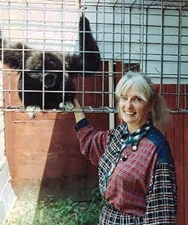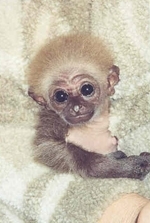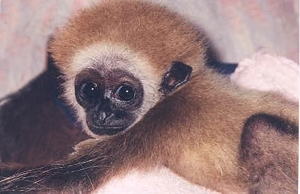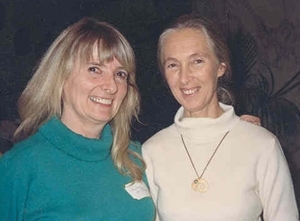 |
Her journey into the primate world began slowly and innocently. "I was living in India writing my doctoral dissertation and constantly saw monkeys around the cities I visited," she said. "I talked a lot with the Indians about their views on animals and visited a Monkey Temple in Varanasi and a Rat Temple near Bikaner."
Dr. McGreal, a native of Cheshire, England, stayed in India from 1969 until 1971 when she moved on to Thailand. There her interest in primates changed from purely academic to activist. "When I moved to Thailand in late 1971, I had to pick up my air freight from India at the airport's cargo area. I saw crates of monkeys awaiting export and imagined they were asking me to help them. I later learned these tiny monkeys were Stumptail Macaques. I began to read all I could about primates. I was surrounded by them in Bangkok as many of my neighbors had gibbons and monkeys as pets. They were openly sold at the Sunday market in Bangkok."
Dr. McGreal wanted to help these primates. She began by contacting all of the authors whose books she had read on primates, and received plenty of advice and information from them. Encouraged, she founded the International Primate Protection League(IPPL) in 1973 with one member – herself (the League now has 15,000 members around the world). It wasn't until 1981 when IPPL was able to adopt its first primate – a two-year-old male gibbon who had spent his entire life in a laboratory.
"He had gone mad from living alone and with only an artificial wire covered with a towel to act as his mother," said McGreal. "This 'surrogate mother' did not have the caring qualities of a real mother and the baby gibbon developed a habit of banging his head out of frustration and loneliness. When this gibbon came to IPPL, we had to work very hard to give him love and a feeling of security. We also gave him a name instead of a number. At the lab he was #HL98, which was tattooed in blue on his tummy. Here at IPPL's sanctuary he is named Arun Rangsi, which is Thai for Rising Sun."
 |
These days the IPPL sanctuary covers ten acres, and houses and cares for thirty-four gibbons, a few friendly otters, and some happy dogs. The sanctuary has three full-time caregivers, two full-time and one part-time office staff, a full-time groundsman, and several eager volunteers. IPPL also has one night nanny for one of the newer arrivals, a baby gibbon the staff has named Courtney.
Dr. McGreal's work has been recognized with such international honors as the United Nations Environment Program Global 500 Award, the Marchig Award for Animal Welfare, and an award from the Interpol-Dutch Police league for work she did on a criminal investigation. She thinks that governments not only benefit from groups like IPPL but need such groups to make sure the governments are doing their job in protecting animals.
Dr. McGreal also believes that any of us can be a hero in our own way and that each person has more power to change things than they realize.
 |
| Dr. McGreal believes in the power of petitions |
"Individuals really can make a difference," she says. "We especially believe in the power of the pen – it's a tool that can be used for good by both young and old. Write letters!"
A tragic event that occurred at the Cairo airport supports McGreal's belief in the power of grassroots activism. Airport veterinarians drowned an infant chimp and an infant gorilla in a chemical vat. They claimed that they feared the animals might have contagious diseases, though no actual diseases had actually been discovered in the primates. Outraged, Dr. McGreal immediately fell to action, organizing a "letter blitz" to the government of Egypt. After receiving thousands of letters and hundreds of petitions condemning the killing, Deputy Prime Minister Youssef Wally publicly vowed that it would never happen again, and that the Egyptian Government would, in future cases, contact African sanctuaries and international animal protection groups to deal with questionable animal cases instead.
 |
Dr. McGreal also treads dangerous territory in her work. She actively exposes animal traffickers and the ways in which they have been able to transport endangered species to sell in countries around the world. This is not safe work: gorilla researcher and conservationist Dian Fossey is believed to have been killed while attempting to foil some poachers. Dr. McGreal risks her life every time she goes undercover to nab smugglers. "My scariest experience was when I went undercover to Singapore, into the compounds of some of the leading animal dealers," said McGreal. Singapore is a center of endangered animal-smuggling operations.
"I told them I wanted to ship animals from Asia to the United States," continued McGreal. "The dealers told me all about their smuggling techniques, such as hiding animals in false petrol tanks on trucks and shipping them on small boats. If they had figured out that I was working to expose their activities, I might have never been seen again."
With the information Dr. McGreal collected, she wrote a detailed news article, called "The Singapore Connection," which was published worldwide by Reuters. Many believe Dr. McGreal’s investigative story was instrumental in Thailand's eventual ban on commerce in gibbons.
Currently Dr. McGreal and IPPL have called for an investigation of the circumstances under which four young gorillas were shipped from Nigeria to Malaysia in January 2002. Gorillas are legally protected in Nigeria; moreover, both Nigeria and Malaysia benefit from a treaty which bans trade in highly endangered animals. Gorillas are a highly endangered species listed on Appendix I of CITES (the Convention on International Trade in Endangered Species). "This is CITES' most restrictive category," says McGreal, "and all commercial trade is banned. Gorillas live in groups. To catch baby gorillas for trade, mother gorillas are shot and often the silverback (older, dominant) male and other gorillas are also killed while protecting their families."
 |
| With chimpanzee expert Jane Goodall |
On being tipped off that four gorillas had appeared at Taiping Zoo, the IPPL began an investigation into the circumstances. On learning that a notorious Nigerian animal dealer might be involved, IPPL contacted the Malaysian CITES unit and provided the unit with a copy of the Nigerian dealer's price list, which offered four baby gorillas for $1.6 million dollars (it is not yet known whether this dealer was involved in the transaction).
The Taiping Zoo has issued a statement that they imported the gorillas for a captive breeding program, and were purchased legally from a new Nigerian zoo where the gorillas were born. No Nigerian zoo has ever bred gorillas.
"These animals are young and may well die before reaching maturity," McGreal says. "Most of the gorillas imported to Asia have died of a ground pathogen called pseudomonas pseudomallei and we worry about these young animals. Further, there is no guarantee they will breed. The sad reality is that, in acquiring what were certainly wild-caught gorillas, the Taiping Zoo was acting in a species-destructive manner and it is very likely that the mother gorillas were eaten after being shot, which would mean that the zoo was participating in the bushmeat trade it deplores."
All of Dr. McGreal's work within the IPPL are time, energy, and cost-intensive and almost always require a lot of risk, more than most people would be willing to take on, which begs the question, is it worth it?
"I love my work and there is a distinction for me between work and play which is my definition of happiness," stated McGreal. "If it weren't for IPPL, I’m quite sure that these Gibbons would either be in continuous abusive situations or probably dead." To Dr. McGreal, that is just not acceptable.
There are other heroes in this story too: the staff of the IPPL who work side-by-side with Dr. Shirley McGreal, and the countless workers at primate centers around the globe who have toiled to save, one-by-one, macaque, gorillas, and gibbons. Finally, there are the primates themselves; gibbons like Arun Rangsi who survived a lonely beginning to life; or Beanie, who, through lack of care in his original laboratory, lost his eyesight; or the baby gorilla and baby chimpanzee who died painfully in chemical drums on the airport tarmac in Cairo. Their plights and heroism will not be forgotten.
Page created on 3/2/2015 1:37:15 PM
Last edited 1/7/2020 8:47:08 PM

Click here to listen to the story.